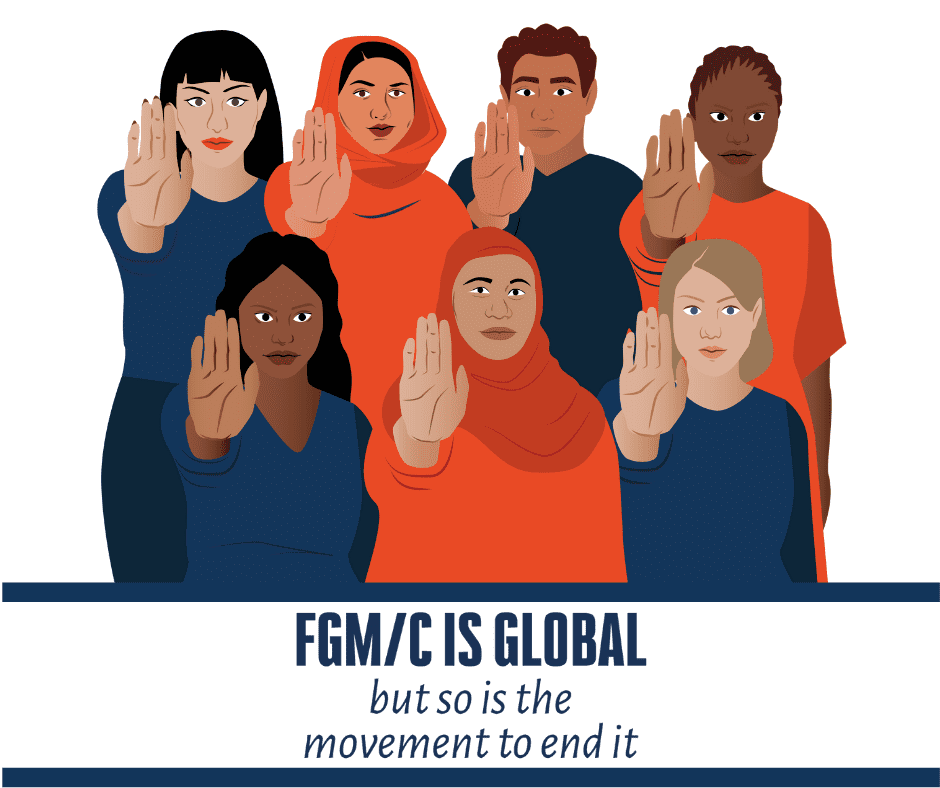
If we want to achieve worldwide eradication of FGM/C by 2030, we must measure FGM/C prevalence in every country and accelerate global efforts to end this harmful practice
March 17th, 2020
The report Female Genital Mutilation/Cutting: A Call for a Global Response, is a new joint publication by Equality Now, End FGM European Network and the US End FGM/C Network, which highlights the global nature of FGM/C and calls for the acceleration of global action to end this practice.
FGM/C is a Global Issue that Requires a Global Response
It is widely acknowledged that the official global picture of FGM/C is incomplete. According to UNICEF figures (2020), FGM/C affects at least 200 million women and girls in 31 countries worldwide. This figure however only includes countries where there is available data from large-scale representative surveys, which consist of 27 countries from the African continent, as well as Iraq, Yemen, the Maldives and Indonesia. Consequently, the current, already worrying numbers are an under-representation since they do not take into account numerous countries where nationwide data on FGM/C prevalence is not available.

FGM/C is present on every continent except Antarctica
There is growing evidence that FGM/C takes place across the world, in numerous countries in Africa, Asia, the Middle East, Latin America, Europe, and North America, among indigenous and/or diaspora communities. As this report shows, there are 32 countries where nationally representative data on FGM/C is available. In addition, there are at least 60 other countries where the practice of FGM/C has been documented either through indirect estimates (usually used in countries where FGM/C is mainly practiced by diaspora communities), small-scale studies, or anecdotal evidence and media reports, demonstrating that FGM/C is present in at least 92 countries around the world. This report, while not aiming to be an exhaustive review of all data on FGM/C clearly shows that FGM/C is a global practice that requires a global response. If we want to achieve worldwide eradication of FGM/C by 2030, we must measure FGM/C prevalence in every country and accelerate global efforts to end this harmful practice.

Officially recognizing FGM/C as a violation (whether in a standalone anti-FGM/C law or through specific provisions in existing laws) is arguably the first step to implementing national interventions to eradicate it and protect women and girls
The report also demonstrates that out of the 92 countries with available data on FGM/C, only 51 have specifically addressed FGM/C within their national legal framework.
Laws against FGM/C are most common in the African continent as well as countries where FGM/C is largely known to be practiced by diaspora communities including in Europe and North America. Asia and the Middle East lag behind in enacting legal prohibitions against FGM/C.
The report is also a clarion call from survivors of FGM/C across cultures, communities, and countries to governments, the international community, and donors to recognize FGM/C as a global issue, requiring urgent global attention.
KEY RECOMMENDATIONS
- Strengthen the global political commitment to eliminating FGM/C
- Urgently increase resources and investment to end FGM/C and support survivors
- Strengthen the evidence base through critical research
- Enact and enforce comprehensive laws and national policies
- Improve wellbeing of survivors by providing necessary and critical support and services
DOWNLOAD and explore the report Female Genital Mutilation/Cutting: A Call for a Global Response
The lack of political will and awareness of the existence of FGM/C worldwide impacts the availability of protective measures for women and girls who are at risk
